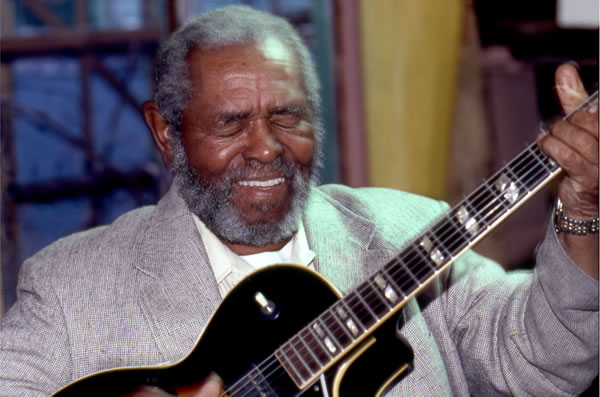Walter Brown “Brownie” McGhee (1915–1996) was one of the most enduring and influential blues musicians of the 20th century. Renowned for his warm voice, expressive guitar playing, and long-standing musical partnership with harmonica player Sonny Terry, McGhee left an indelible mark on both acoustic and folk blues traditions. His legacy continues to inspire blues fans and musicians around the world.
Early Life and Musical Roots
Brownie McGhee was born on November 30, 1915, in Knoxville, Tennessee, and raised in Kingsport. As a child, McGhee contracted polio, which left one leg with limited mobility. During his recovery, he immersed himself in music, learning to play the guitar, piano, banjo, and ukulele. His father, George McGhee, was a factory worker and musician who encouraged his son’s interest in music, and Brownie’s early exposure to church spirituals and rural blues set the foundation for his lifelong musical path.
Inspired by artists like Blind Boy Fuller and Lightnin’ Hopkins, McGhee began performing as a teenager and became part of the vibrant Southern blues scene. In the 1930s, he joined the Rabbit Foot Minstrels, a traveling vaudeville show that exposed him to diverse musical styles and allowed him to develop his stage presence.
The Partnership with Sonny Terry
Brownie McGhee’s career took a defining turn in 1941 when he met blind harmonica virtuoso Sonny Terry. Their musical chemistry was immediate and enduring. Together, they forged one of the most celebrated duos in blues history, combining McGhee’s melodic guitar and vocals with Terry’s wild, emotive harmonica playing. Their performances were both musically rich and theatrically captivating.
The pair recorded prolifically, starting with classic blues for labels like Okeh and Columbia and later expanding into the folk-blues revival scene. They appeared at numerous festivals, colleges, and clubs, becoming fixtures of the American folk music circuit during the 1950s and 1960s. Notable albums from their collaboration include Down Home Blues (1959), Brownie McGhee and Sonny Terry Sing (1960), and Sonny Terry and Brownie McGhee at Sugar Hill (1962).
Broadway and Film Appearances
Brownie McGhee’s talents extended beyond the concert stage. He and Sonny Terry appeared in several Broadway productions, most notably the 1947 play “Finian’s Rainbow,” which brought their music to a new audience. They also made film and television appearances, helping introduce the blues to mainstream American culture. McGhee acted in several films, including a notable role in the 1985 movie “Angel Heart” alongside Mickey Rourke and Robert De Niro.
Solo Work and Later Years
While best known for his partnership with Sonny Terry, Brownie McGhee also had a successful solo career. He recorded numerous solo albums that showcased his smooth vocal style and fingerpicking guitar technique, often blending blues with gospel, jazz, and folk influences. His solo work includes albums like Brownie’s Blues (1965) and The Last Great Blues Hero (1991).
Despite a falling out with Sonny Terry in the 1980s, McGhee continued performing and recording on his own. His later years were marked by international tours and recognition as a living legend of the blues.
Death and Legacy
Brownie McGhee passed away on February 16, 1996, in Oakland, California, at the age of 80. Though he is gone, his influence lives on. Through his rich catalog of recordings and the musicians he mentored and inspired, McGhee helped define the sound and soul of modern blues.
He is remembered not only as a gifted guitarist and singer but also as a cultural bridge who brought the African-American blues tradition to a global audience. His partnership with Sonny Terry remains one of the most iconic in American music history, and his contributions to blues and folk music have earned him a lasting place in the pantheon of great American musicians.

No responses yet